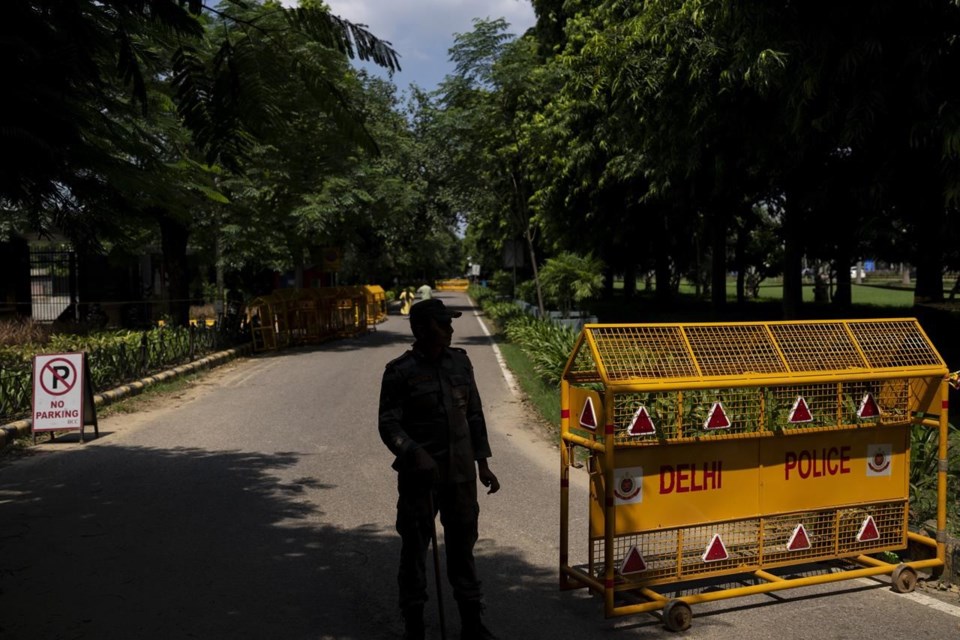TORONTO — The escalating tension between Canada and India is jeopardizing delicate trade and investment relationships that the two sides have been working for years to advance, business leaders said.
On Monday, Prime Minister Justin Trudeau accused India of being involved in the killing of a man wanted by authorities in that country. Hardeep Singh Nijjar, a Sikh activist and Canadian citizen, was gunned down in June outside a Sikh temple in suburban Vancouver.
The situation escalated in the following days, with both sides engaging in a diplomatic tit-for-tat by expelling one another's representatives. India has also temporarily halted all visa services for Canadian citizens.
Victor Thomas, president and CEO of the Canada-India Business Council, said this country has been trying to grow its trade relationships with India, which is the world’s biggest country by population and the world’s fastest-growing large economy.
Now, trade talks are being affected as the two countries face off, with Canada’s trade minister postponing a planned October mission to India.
Business likes stability and predictability, said Thomas. This is anything but.
“In the midst of all this ... we're trying to see, you know, where things land and how we can actually navigate into the future.”
Just a few weeks ago, Thomas said Canadian business leaders had high hopes that Ottawa and India could ink an Early Progress Trade Agreement (EPTA), widely seen as an important step en route to a broader Comprehensive Economic Partnership Agreement (CEPA).
Negotiations for a deal covering specific industries began in 2010, were put on hiatus for five years and finally resumed in 2022, but Canada paused the process once again at the beginning of this month. The news was met with surprise and concern from the business community, with Saskatchewan Premier Scott Moe's government at the time saying provinces were being kept in the dark.
Saskatchewan accounts for a large portion of Canadian exports to India. Canada sent $5.3 billion worth of goods to that country in 2022, or 0.7 per cent of global exports, according to Statistics Canada. Imports from India amounted to $8.3 billion, around 1.1 per cent of total global imports.
Some of the top Canadian products exported include mineral ores and non-metallic minerals, in particular potash, as well as pulses like lentils.
Thomas said there’s a lot of untapped trade potential between the two countries, but now much of the progress appears squandered.
Thomas was in India this week with a delegation when the news of Trudeau’s allegation broke. He said the talks were cancelled.
While the longer-term impacts of this situation are still unknown, for some in the business world, things are changing in real time, said Jonathon Azzopardi, CEO and president of Ontario manufacturing company Laval Tool & Mould Ltd., and a director at the Canadian Association of Moldmakers.
He said his company was scheduled to meet with the Indian government this week about participating in projects over the coming year.
“Although they talked nicely about it, they made it very clear that this situation between Canada and India has to work its way out ... before they'll move any further,” said Azzopardi.
When it comes to business, it’s not an equal relationship given India’s size, said Azzopardi. “Canada needs India more than India needs Canada.”
And right now, delicate relationships between the two countries are on rocky ground, he said.
“These are the types of things that may break relations forever. And India already is a very complicated and difficult country to create trade relations with,” he said.
Flavio Volpe, president of the Automotive Parts Manufacturers' Association, said he’s more concerned about the dispute's longer-term ramifications for his industry than any immediate impact, but is also hopeful the issue can be resolved.
There’s not a lot of trade between India and Canada when it comes to the auto sector, but there’s a lot of Canadian investment in Indian manufacturing, he said. Existing deals will continue amid the tensions, he added.
However, over the longer term, the security climate is important for business, he said. Investors will want answers about whether Trudeau’s allegations are true, to know that they’re investing in a country that aligns with the rule of law.
So depending on how this plays out, longer term investment progress could stall, said Volpe.
India's suspension of visa services could also have major impacts on the business community because trade and investment often require travel, said Thomas.
“It's all happening in real time. And we're all trying to get our heads around it,” he said.
This report by The Canadian Press was first published Sept. 22, 2023.
— With files from Dylan Robertson in Ottawa and Ian Bickis and Sammy Hudes in Toronto.
Rosa Saba, The Canadian Press




